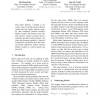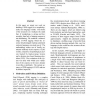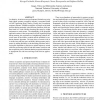21 search results - page 1 / 5 » Self-Organizing Markov Models and Their Application to Part-... |
ACL
2003
13 years 8 months ago
2003
This paper presents a method to develop a class of variable memory Markov models that have higher memory capacity than traditional (uniform memory) Markov models. The structure of...
ACL
2006
13 years 8 months ago
2006
In this paper we report our work on building a POS tagger for a morphologically rich language- Hindi. The theme of the research is to vindicate the stand that- if morphology is st...
GECCO
2008
Springer
13 years 8 months ago
2008
Springer
Many sectors of the military are interested in Self-Organized (SO) systems because of their flexibility, versatility and economics. The military is researching and employing auto...
WIAMIS
2009
IEEE
14 years 1 months ago
2009
IEEE
An adaptive, invariant to user performance fluctuation or noisy input signal, gesture recognition scheme is presented based on Self Organizing Maps, Markov Models and Levenshtein...
IJIT
2004
13 years 8 months ago
2004
This paper describes our work on Bengali Part of Speech (POS) tagging using a corpus-based approach. There are several approaches for part of speech tagging. This paper deals with ...



